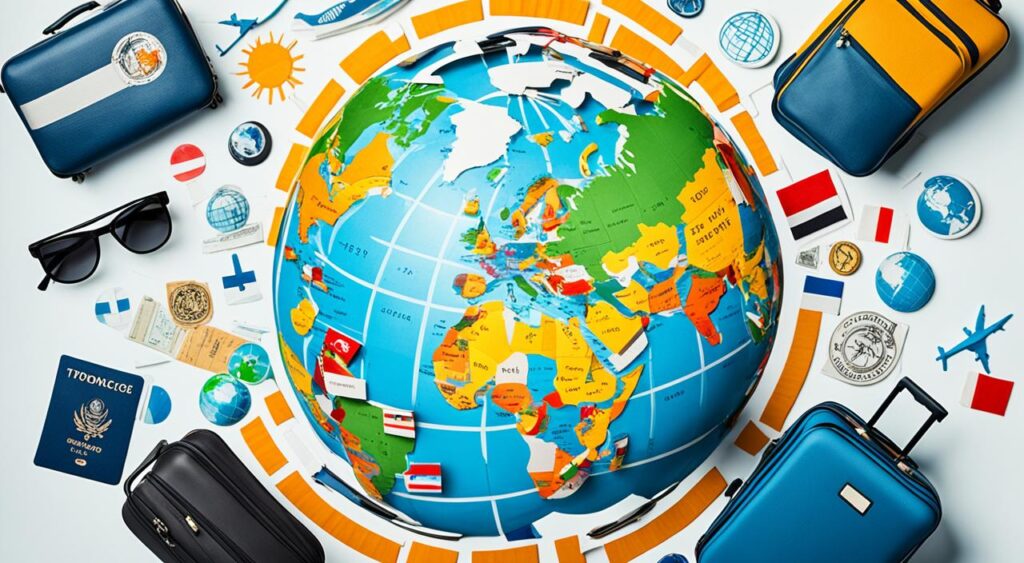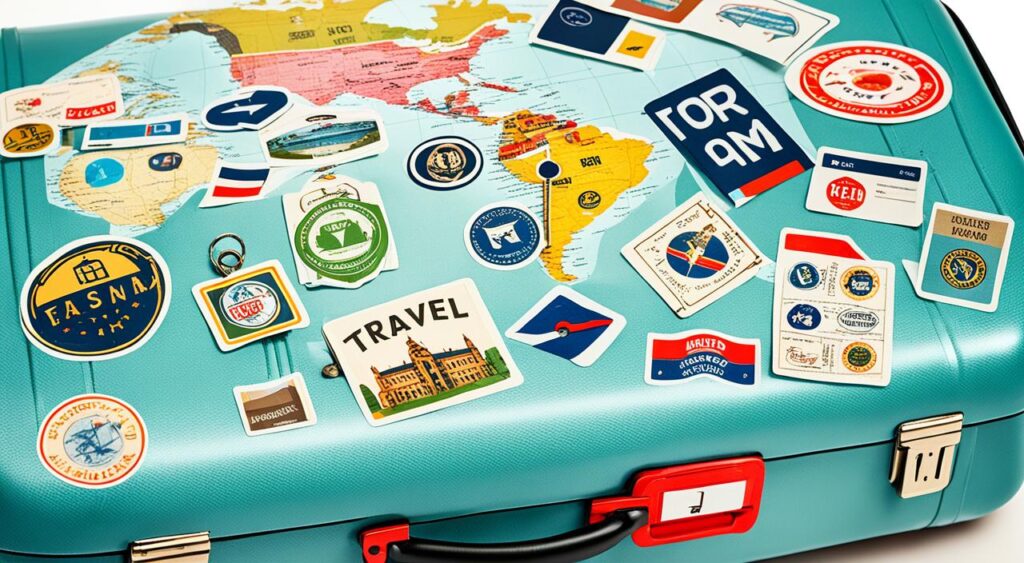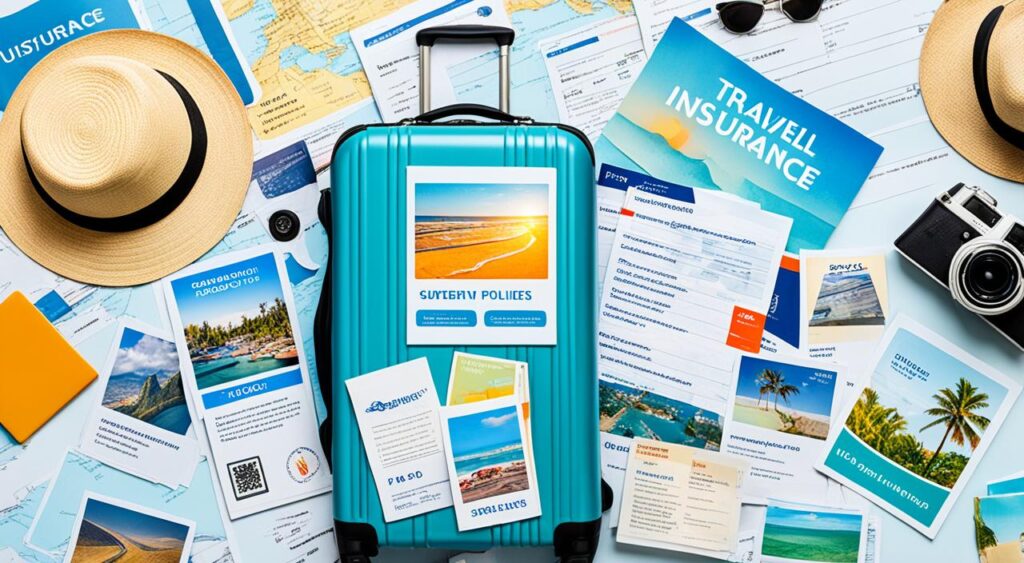Planning a trip, big or small, takes effort and can be pricey. Unexpected events like getting sick or a flight delay can happen. They may lead to extra costs and cut your trip short. Travel insurance steps in to protect you from these possible financial hits. It comes in various types, each handling different risks and costs. We will go over these types, how much they cost, and what they cover. This info will help you choose the right travel insurance for your needs.
Key Takeaways
- Travel insurance provides coverage against unexpected events that can disrupt or cut a trip short, such as illness, injury, flight delays, or natural disasters.
- The types of travel insurance include trip cancellation/interruption, travel medical, emergency medical evacuation, accidental death and dismemberment, and baggage protection.
- Travel insurance premiums typically range from 4-10% of the total trip cost and vary based on factors like age, destination, and coverage type.
- Reviewing the policy details and understanding coverage limitations and exclusions is crucial when selecting a travel insurance plan.
- Purchasing travel insurance in advance of a trip allows for better planning and ensures access to coverage for unexpected events.
Introduction to Travel Insurance
Travel insurance is like a safety net when you’re on the move. It helps with risks and losses on your trip. The problems it covers can be small, like missing a connection, or big, like getting hurt or very sick. It catches you if your trip is cut short by things like accidents, sickness, delays, or even natural disasters.
Understanding the Need for Travel Insurance
Thinking of traveling the world or just across the state to a wedding? You might wonder if travel insurance is worth it. The key is knowing what you stand to lose. Learn about what travel insurance does and doesn’t cover. This knowledge helps you decide if it’s right for you.
Unexpected Circumstances That Can Affect Your Trip
Bad stuff can happen when you travel. Things like getting sick, missing your flight, or facing a natural disaster. These issues could end your trip early and cost you money. Travel insurance steps in to protect your wallet. It makes sure you don’t stress while traveling.
Travel Insurance
Travel insurance is a special kind of insurance. It protects you from losing money when you travel. It helps if something bad happens before or during your trip.
Definition of Travel Insurance
It’s a safeguard for your trip. If it’s canceled or you have a medical emergency, it can help. It also covers lost luggage and other surprises while you’re away.
Typical Costs of Travel Insurance
Travel insurance often costs 4-10% of your trip’s total. The price changes based on things like what kind of coverage you pick, your age, where you’re going, and your trip’s cost.
Factors Affecting Travel Insurance Premiums
Many things influence how much your coverage costs. These include the type and level of coverage, your age, where you’re going, how long you’ll be there, and your trip’s cost. It’s smart to check your policy so you know what affects your price.
Types of Travel Insurance Coverage

When it comes to travel insurance, there are several key coverage options. These include
trip cancellation and interruption coverage, travel medical and major medical insurance, emergency medical evacuation and repatriation, accidental death and dismemberment coverage, baggage loss and delay protection, and cancel for any reason (CFAR) policies
Trip Cancellation and Interruption Coverage
Trip cancellation insurance helps when you can’t go on your trip due to illness or a family emergency. It reimburses your non-refundable expenses. Trip interruption will help if you have to come home early for a covered reason.
Travel Medical and Major Medical Insurance
Travel medical insurance covers unexpected medical costs while traveling, like doctor visits or hospital stays. Major medical insurance gives more coverage for severe medical issues during your trip.
Emergency Medical Evacuation and Repatriation
Emergency medical evacuation covers the cost to get you to necessary medical care. It’s important for areas where local healthcare is limited. This includes getting you back home if needed.
Accidental Death and Dismemberment Coverage
Accidental death and dismemberment coverage gives benefits if you’re in a deadly accident. It also covers the loss of a limb or eyesight. It provides financial help for your family in such cases.
Baggage Loss and Delay Protection
Baggage loss coverage pays for lost or stolen items. Baggage delay coverage helps cover the cost of buying necessary items if your luggage is delayed.
Cancel for Any Reason (CFAR) Policies
Cancel for Any Reason (CFAR) policies let you cancel for any reason and get a portion of your costs back. They offer more flexibility at a higher cost than standard policies.
Epidemic and Pandemic Coverage

Travel insurance usually doesn’t cover epidemics and pandemics. The COVID-19 pandemic is a known global issue. This means policies bought now might not help with trip changes or cancellations. Some might offer a bit of help if a country you’re visiting has new travel rules.
Typical Exclusions for Epidemics and Pandemics
Most travel plans won’t pay for trips cut short by epidemics or pandemics. These are seen as risks you should know about before. Make sure to check your policy closely. Things not covered can vary with each insurer.
COVID-19 Coverage Considerations
Finding coverage for COVID-19 is a bit tricky. This pandemic was quickly tagged as a global issue. Your regular insurance might not cover trip changes or cancellations. Unless you have special “cancel for any reason” cover. But, this kind of plan doesn’t pay back as much. Always look closely at what your policy does and doesn’t do.
Protecting Yourself with Travel Insurance
Figuring out if you need travel insurance means looking at your trip and life. Think about the chance of bad weather or sudden changes messing up your trip. Consider if you or anyone else traveling is not in the best health. Travel insurance is worth it if health is a concern.
Determining if Travel Insurance is Right for You
Imagine what could cause you to cancel or cut short your trip. Will a weather delay mess up your plans? Do you worry about conflicts or dangers where you’re going? CDC warnings might also make you think about insurance. These are good reasons to look into coverage.
Understanding Coverage Limitations and Exclusions
Reading the insurance policy details is key. Understand what’s covered and how to make a claim. Be sure to check for health exemptions. These are crucial if you or someone you’re traveling with has a health issue.
Timing of Purchase for Travel Insurance
It’s smart to buy insurance early. Some plans need you to purchase them within a few days of your first trip payment. Topping up early helps you make better plans and know what’s covered.
Homeowners Insurance and Travel Protection

Did you know your homeowners or renters insurance can help protect you while traveling? Homeowners insurance coverage for travel safeguards your personal items even on the go.
Your homeowners policy can help when personal property is lost or stolen during a trip. So, if someone steals your bag or you lose valuable items on vacation, your policy might cover it. Always check what’s in your plan to be certain.
Also, you could already have additional travel protection from your homeowners, renters insurance, or credit cards. Using certain credit cards for travel bookings can offer insurance benefits. Talk to your insurance agent and card companies to see what travel insurance coverage you can get before buying more.
| Coverage Type | Homeowners Insurance | Credit Card Travel Insurance |
|---|---|---|
| Personal Property Theft | Yes | Varies |
| Trip Cancellation/Interruption | No | Varies |
| Travel Medical Coverage | No | Varies |
| Rental Car Damage | Yes | Yes |
Know your homeowners insurance coverage for travel and any additional travel protection you might have. This info helps you decide whether to buy more insurance for your next trips.
Top Tips for Buying Travel Insurance

When buying travel insurance, it’s key to understand the policy. Check the coverage limitations and exclusions to make sure it fits your needs. Remember to review your existing insurance coverage too, to avoid doubling up on protection.
Read and Understand the Policy
Buying travel insurance can be wise, but not all needs are covered. If you have health issues, find a plan that covers them. For risky destinations, ensure you’re protected if you need to cancel.
Review Coverage Limitations and Exclusions
Know what’s not covered. Be aware of exclusions like previous health issues. Always check the policy to see what’s included and what’s not.
Consider Your Existing Insurance Coverage
For expensive trips, look into insurance early. Some plans need you to get insurance within a specific time after booking. It’s best to shop for insurance early to avoid missing coverage for your trip.
Primary and Secondary Travel Insurance Coverage
Buying travel insurance means knowing about primary and secondary travel insurance coverage. Primary travel insurance coverage pays you first, stopping you from making a claim elsewhere. This can keep your rates from going up.
Secondary travel insurance coverage asks you to try for claims with other coverage first. For example, talk to your airline for delayed or lost bags. Or, ask your car insurance about rental car damage. If these fail, your travel insurance will step in.
| Primary Travel Insurance Coverage | Secondary Travel Insurance Coverage |
|---|---|
| Reimburses you first without needing to file a claim elsewhere | Requires you to file a claim with other available coverage sources first |
| Helps avoid potential increases in your policy rates | May cover remaining costs not reimbursed by the primary provider |
Knowing the difference between primary and secondary travel insurance coverage is key. It helps in choosing the best policy for your trip and money. Check the coverage details to make sure you’re well protected.
Travel Insurance Requirements and Limitations
Travel insurance comes with rules and limits to know. Knowing about the travel insurance coverage requirements, policy coverage limits, and exclusions is key. This helps travelers understand their insurance needs and avoid bad surprises when making claims.
Coverage Requirements
To make a claim, travelers must meet agreed requirements. This includes buying the insurance within a set time, often after booking their trip. The policy could exclude previous medical conditions unless the insurance is bought early. It’s important to check the policy to see what you need for different claims.
Policy Coverage Limits
Every insurance policy has coverage limits which are the most they’ll pay for claims. For example, losing baggage might have a limit for each item. Medical expenses might be covered up to a certain amount per incident or trip. Knowing these limits ensures the policy fits your travel needs and costs.
Exclusions
Insurances also list things they won’t cover, called exclusions. This can include pre-existing health issues, war, or acts of terrorism. Even normal pregnancy may be excluded, as well as some weather situations. It’s important to read your policy carefully and understand these exclusions. It helps you know what to expect and what might cost you extra.
Understanding the travel insurance coverage requirements, policy coverage limits, and exclusions lets travelers choose well. They can get the right coverage to protect their trips from surprises. This way, travelers can enjoy their trips more, knowing they are prepared for the unexpected.
Comprehensive Travel Insurance
Comprehensive travel insurance is like a big box of protection. It includes many types of coverage. These help guard travelers from all kinds of problems they might face on their journey.
Components of Comprehensive Travel Insurance
The common parts of comprehensive travel insurance are:
- Trip Cancellation and Interruption Coverage – This pays you back for things you couldn’t get a refund on. It could be because you got sick or there was a natural disaster.
- Medical Expense and Evacuation Coverage – This covers the costs if you have a health emergency while traveling. It includes seeing a doctor, hospital costs, and getting you to the right medical care if needed.
- Baggage and Personal Effects Coverage – This helps when your luggage or personal items are lost or damaged during your trip.
- Travel Delay and Missed Connection Coverage – This takes care of extra costs if your flight gets delayed, or you miss a connection.
24-Hour Assistance Services
Comprehensive travel insurance also offers help round the clock. If something bad happens during your trip, these services can jump in to help. They typically offer:
- Arranging for medical care and coordinating with healthcare providers
- Assisting with lost or stolen passports, credit cards, or other important documents
- Providing cash wire transfers and other financial assistance
- Rebooking canceled flights or other travel arrangements
Remember, the help available and what it actually includes can change with each insurer. Be sure to check what the policy says exactly.
Rental Insurance Coverage
Rental insurance can really protect your holiday and travel activities. It’s made up of two main types, which are vacation rental insurance and rental car insurance.
Vacation Rental Insurance
This insurance helps if you accidentally damage a holiday home. It might also refund you if you can’t go there after all. It’s great for peace of mind against unexpected holiday disruptions.
Rental Car Insurance
Rental car insurance looks after a car you rent during your trip. It stands in for the rental company’s CDW or your own car insurance. It often covers crashes, theft, and other issues. But remember, it doesn’t deal with injuries or damage you cause to others.
Travel Health Insurance
When you’re getting ready for a trip, local or global, remember travel health insurance. It can be a lifesaver. It helps with things like sudden medical or dental costs abroad. It’s also key for getting help if you need to leave for medical reasons quickly.
Foreign Travel Medical Coverage
Foreign travel medical coverage saves you from the big bills of healthcare outside your home place. You can get it for a short visit or a long stay. It helps with the costs of getting medical help while traveling in another country.
Medical Evacuation Coverage
Then there’s medical evacuation coverage in travel health insurance. This part is very important too. It pays for special transport to a better medical center or even back home if you’re really sick or hurt.
Pre-existing Condition Waivers
Having a health issue already makes finding the right travel health insurance harder. But, some plans offer help with this. They do this through “pre-existing condition waivers.” It’s vital to read the plans carefully so you’re fully covered.
Also Read: Who Qualifies For Crop Insurance In The USA?
Conclusion
Travel insurance is key for covering various risks before and during your trip. It comes in many types with different costs. Knowing your needs makes picking the right plan easier.
If your trip gets canceled or you face a medical crisis, travel insurance has your back. It also helps with lost baggage, or damage to rental cars and properties. This article shows why travel insurance is important. We also discuss things to think about when choosing a plan.
In the end, getting travel insurance is a smart move for any trip. It shields you from unexpected costs and problems. By looking into what each plan offers, you can travel worry-free and focus on the fun.
FAQs
Q: What are the different types of travel insurance available?
A: There are various types of travel insurance policies such as trip cancellation insurance, emergency medical insurance, baggage insurance, and comprehensive travel insurance plans.
Q: How do travel insurance companies determine the cost of insurance?
A: Travel insurance costs are determined based on factors such as the traveler’s age, trip duration, destination, coverage limits, and any additional coverage options chosen.
Q: Why do I need travel insurance?
A: Travel insurance provides financial protection against unforeseen events such as trip cancellations, medical emergencies, lost baggage, or trip delays which can save you from unexpected expenses.
Q: How can I find the best travel insurance plan for my trip?
A: You can compare travel insurance options from various providers on travel insurance comparison sites or consult with a travel agent to help you find the best travel insurance plan that suits your needs.
Q: What are the benefits of purchasing travel insurance?
A: Travel insurance provides benefits such as trip cancellation coverage, emergency medical assistance, coverage for lost baggage, trip delays, and other unforeseen events during your trip.
Q: How do I file a travel insurance claim?
A: To file a travel insurance claim, you typically need to contact your insurance provider directly and provide necessary documentation such as receipts, medical reports, or other relevant information related to the claim.
Q: Can I cancel my trip and receive a refund with travel insurance?
A: Depending on the type of insurance plan you have, you may be able to cancel your trip and receive reimbursement for non-refundable travel expenses if the reason for cancellation falls within the policy’s coverage terms.
Source Links
- https://disb.dc.gov/page/taking-trip-information-about-travel-insurance-you-should-know-you-hit-road
- https://www.nationwide.com/lc/resources/home/articles/what-is-travel-insurance
- https://www.investopedia.com/terms/t/travel-insurance.asp





